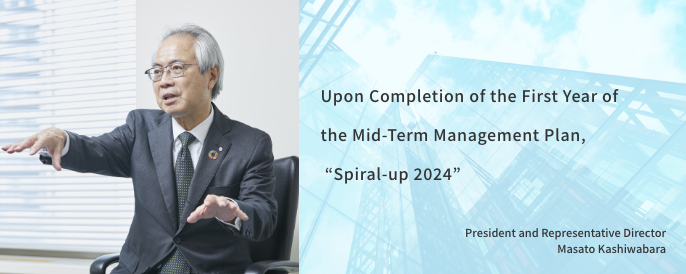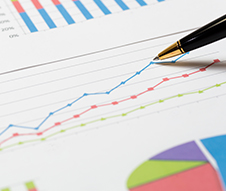Message from President
- Top
- Investor Relations
- Message from President


Looking at the global economy in the current fiscal year, countries around the world continued to relax the infection countermeasures and activity restrictions they had established in response to the novel coronavirus (COVID-19) pandemic, and there were signs of a resumption in global economic activity, centered on personal consumption. However, the outlook remains uncertain due to the prolonged Ukraine situation as well as ongoing inflationary pressure caused by factors such as soaring energy prices.
In the automotive industry, shortages of semiconductors and disruptions to supply chains worldwide have continued to affect production activities. In electronics-related industries, there has been a softening of demand for personal computers and other products, and LCD panel manufacturers are continuing to adjust their inventories.
Although the Japanese economy is showing signs of recovery toward a normalization of socio-economic activities, through measures such as an easing of restrictions on behavior, uncertainty continues to linger due to concerns about falling consumption caused by soaring energy and other prices, and volatility in the foreign exchange and interest rate markets. In addition, responses to environmental issues, such as reductions in greenhouse gas emissions and the problem of climate change, are becoming increasingly important.
In Japan’s foam plastics industry, food container-related demand, primarily for home-cooked and ready-made meals, is slowing, due in part to the easing of restrictions on behavior. Due to the impact of the continued shortage of semiconductors and other issues, demand for parts, transport materials and packaging materials has yet to experience a full-fledged recovery, and high prices for energy and other factors continue to remain an issue.
Against this challenging business environment, the Group is relaxing its activity restrictions while continuing to implement measures for avoiding risks related to COVID-19, and the entire Group is working as one to tackle the three key issues of the three-year Mid-term Management Plan, “Spiral-up 2024” which was launched this fiscal year.
For the key issue of “Strengthen the earnings structure,” we are working to restructure our business portfolio through the selection and concentration of management resources, make drastic innovations in production, and rapidly generate profits from developed products.
To promote a “Shift to businesses that solve environmental and social issues,” we have also positioned “expanding Sustainable Star Products through recycling-based business” and “striving to achieve carbon neutrality” as key issues, while further striving to strengthen the promotion of SKG-5R*(*1) activities. As part of this initiative, we are developing new materials with lower environmental impacts, such as “ReNew+” (*2) and “BIO Cellular” (*3), and are working to efficiently manufacture and expand sales of these products.
By blending our proprietary recycling techniques with polymerization technology, we have established a new mass production technology for recycling fish boxes, which had previously been an arduous task due to odor, and increased the recycling ratio for raw materials to as high as 50%. We also promoted the introduction of equipment to shift from fossil fuels to renewable energy sources for the energy used in our production activities, and deployed solar power generation systems at four of our Group company sites in Japan.
To “Reinforce our management foundations,” which is the third key issue, we identified and worked to address Materiality. As part of these efforts, we view our employees as important management resources, and are promoting “human capital management.” We have made the Health management declaration with the aim of maintaining and improving the mental and physical health of our employees, and were certified in the Health and Productivity Management Organization Recognition Program 2023 (Large Enterprise Category).
In terms of sales, in the Human Life segment, we strove to increase sales volume in conjunction with price revisions and a recovery in the flow of people, while in the Industry segment, we worked to expand sales in fields where a recovery is already underway. In terms of profits, we responded to multiple negative impacts in the first half, such as those of the global supply chain disruption resulting from lockdowns in Shanghai, China and other locations, the fire at Sekisui Kasei Oita Co., Ltd., and soaring prices for raw materials and fuel, by steadfastly working to reduce costs, cut fixed expenses, and pass on to selling prices, but we were unable to completely offset these negative factors.
As a result, during the current fiscal year we achieved net sales of 124.683 billion JPY (up 6.1% YoY), operating income of 0.793 billion JPY (down 45.8% YoY), ordinary income of 0.704 billion JPY (down 49.7% YoY), extraordinary income of 1.632 billion JPY derived from partial sales of investment securities, and after deducting income taxes, net income attributable to owners of the parent of 0.452 billion JPY (compared to a net loss of 5.917 billion JPY for the previous fiscal year).
The year-end dividend for the current fiscal year is set to be 9 JPY per share. Together with the interim dividend of 3 JPY per share that already paid, the total annual dividend will be 12 JPY per share, which is the same as in the previous fiscal year.
When considering the future outlook, attention must be given to the recovery from the COVID-19 pandemic, changes in geopolitical risks such as the declining situation in Ukraine, exchange rate fluctuations, and changes in the prices of raw materials and energy.
In the Human Life segment, although demand related to home-cooked and ready-made meals, such as supermarket food trays and restaurant to-go containers is expected to settle down, demand for entertainment and tourism-related materials is expected to rise and remain strong in conjunction with the return of inbound tourist demand. In the Industry segment, which extends globally, there are concerns in the mobility field of a lack of stability in the supply of components such as semiconductors, as well as concerns regarding supply chain risks due to the Ukraine situation. However, although there is some degree of future uncertainty, we expect to see a recovery in material applications and parts packaging materials. In the electronics field, we forecast a recovery in demand for LCDs as a whole, for which business has recently been sluggish.
Consolidated earnings forecasts for the fiscal year ending March 31, 2024 are net sales of 130.0 billion JPY, operating income of 2.0 billion JPY, ordinary income of 1.7 billion JPY, and net income attributable to owners of the parent of 0.55 billion JPY.
I humbly request the continued warm support and encouragement of our shareholders, going forward.
*1 “SKG-5R” refers to SKG as SEKISUI KASEI Group, and 5R as Reduce, Reuse, Recycle, Replace, and Re-create.
*2 “ReNew+” is the Company’s brand for the category of products that use recycled materials.
*3 “BIO Cellular” is the Company’s brand for the category of products that use biodegradable plastics or plastics derived from biomass.



